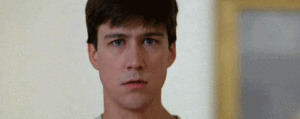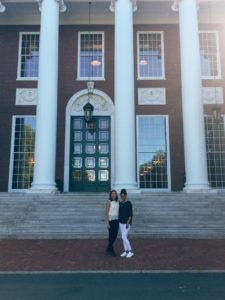Last year, when I was just starting out at Scripps, I would try to leave the majority of my weekend free so I could get schoolwork and other errands done. Having events and obligations to work around seemed like it would limit my productivity, so my solution was just to plan absolutely nothing. At the time, I truly thought this was the “responsible” thing to do, because it meant that I could get more done, and thus feel better about myself. I definitely did get a lot done, but looking back, I don’t think it was the most effective means for managing my time. The thing is, I turned down a lot of opportunities to go to meaningful social events because I was convinced that I needed to get ahead for the week. Instead of taking the two hours on a Saturday night to go to an event that would have connected me to others and made me happy, I would spend those two hours in the Clark dorm computer lab. The problem with this was that I could have done the work during the day and then gone out at night, and still have gotten the exact same amount of work done, but because I wouldn’t plan anything all day, I would be more likely to procrastinate during the day because I didn’t have any events to work around.
This semester however, I have scheduled in a wide range of various social events and extracurriculars (many of which are off-campus). At the beginning of the semester I was worried I would get behind on school-work or other responsibilities, but I’ve actually done a much better job at managing my time when I have more things planned. For instance, every month or so I go away for the entire weekend for Ultimate Frisbee tournaments. I never end up doing homework on these weekends, but somehow it always ends up working out because having the knowledge that I am going away gives me an incentive to cross things off my list ahead of time so I don’t have to worry about it as much during the weekend. These weekends have also helped me learn how to prioritize certain assignments and tasks over others. Sometimes you can’t get everything you need to get done without sacrificing your mental or physical health, and I personally value my health over good grades or productivity. Thus, I have learned how to prioritize what needs to get done first, what can be done later, and what can be done someone hastily.
In addition, I also used to feel oddly guilty for planning too many “fun” things during my weekend, because I would sometimes hear my peers complaining about how they “got up at 5:00am to study for an exam,” or how they had “spent the entire weekend in the library,” and I would feel oddly competitive, like I had to prove that I was a good student.
Something I have really learned in college is that there is really no use comparing school or work schedules with others. Unlike high school, everyone’s college schedules are so incredibly different given the nature of how varied scheduling is for classes, jobs, and extracurriculars. Another thing I have realized, is that there is always someone who is doing more than you, or who is more productive than you, and at a certain point it’s out of our control and not worth feeling bad about. Plus, being balanced and well-rounded is extremely important in my opinion, so even the people who seem like they are absurdly productive and have it all together might actually be super stressed and unbalanced the majority of the time.
Doing school work is important. Working is important. Doing laundry, running errands, and paying bills is important. However, going to dinner with friends, eating chocolate, taking walks outside, playing sports, going to parties, and reading for fun is also important. Taking the time to do things I love has made me more productive in the long run, because when I don’t schedule in fun things, I inevitably burn out and lose interest. Of course, there is a fine-line between having a schedule that keeps you motivated and busy in a good way, and having a schedule that makes you stressed and busy in a way that is damaging to your health. It is important to know yourself, and plan a school and work schedule that is based off of your individual needs and stress-level, rather than anyone else’s.








 Sitting immersed in art for eight hours a week has helped me to learn how to really look at my surroundings. I’ve always been an observant person, and I’ve always been critical of the world around me. I like to know how and why thing are the way they are, and I work hard to understand the things that I see. Art isn’t an easy thing to observe. It is subjective, and different people find different meanings in it. A piece that I find inspiring and filled with movement and life, another could find oppressive and representative of human adversity to confinement.
Sitting immersed in art for eight hours a week has helped me to learn how to really look at my surroundings. I’ve always been an observant person, and I’ve always been critical of the world around me. I like to know how and why thing are the way they are, and I work hard to understand the things that I see. Art isn’t an easy thing to observe. It is subjective, and different people find different meanings in it. A piece that I find inspiring and filled with movement and life, another could find oppressive and representative of human adversity to confinement. Even though my job on campus is seemingly as far as possible from what I want to do in the future, it has helped me to develop skills that I will use in my career one day. Did I expect this to happen? Absolutely not, but I am so glad that it has. I encourage you to go out and gain experience in any and all work environments. I guarantee that you will develop networking, practical, and/or observational skills that will help you grow throughout your future path. Whatever those newly refined skills are, you will be happy you have them, and you will learn more about yourself, your interests, and your future career along the way. So if even if you have a job that on paper seems like it has no relevance to your desired path, no need to worry! The lessons you learn will be relevant to your life experience, and those lessons can be applied to any career, so long as you are willing to open your eyes and find them.
Even though my job on campus is seemingly as far as possible from what I want to do in the future, it has helped me to develop skills that I will use in my career one day. Did I expect this to happen? Absolutely not, but I am so glad that it has. I encourage you to go out and gain experience in any and all work environments. I guarantee that you will develop networking, practical, and/or observational skills that will help you grow throughout your future path. Whatever those newly refined skills are, you will be happy you have them, and you will learn more about yourself, your interests, and your future career along the way. So if even if you have a job that on paper seems like it has no relevance to your desired path, no need to worry! The lessons you learn will be relevant to your life experience, and those lessons can be applied to any career, so long as you are willing to open your eyes and find them.